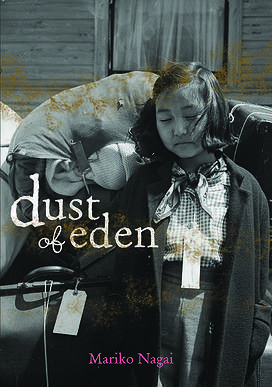What I’m Reading: dust of eden by Mariko Nagai
Filled with images of red roses, dry earth, and barbed wire, Mariko Nagai shows the beauty within broken hearts in this verse novel that follows the story of a girl who feels more American than Japanese even as she leaves behind a best friend, an orange cat, a boarded-up house, and “Seattle with its sea smell” to go with her mother, grandfather, and brother to an internment camp. dust of eden begins with Mina Masako singing with her Sunday school when a man bursts in to announce, “The Japs bombed Pearl Harbor.” When the children return to their music, “…we were no longer singing as one.” The next day in school, immediately after the teacher speaks Mina’s name for the roll call, she mentions Pearl Harbor, and while Mina feels American, she knows the eyes on her don’t see that. She learns to hear the pause between “Jap” and “anise.”
While Mina reacts mostly with fear as her newspaperman father is put in jail, her older brother is angry. The adults seem to Mina to be play-acting that all is well. Eventually the family is told that they can bring two suitcases – we get echoes of this with verse in couplets – to an interment camp. Mina hates to leave behind their old orange cats who likes “to have his ears/ pulled gently… He grew up drinking/ miso soup…” There’s a moving goodbye to her best friend as they leave the house with furniture covered with white sheets and the cherry tree that had begun to bud.
The family first stays at a former fairgrounds pounded down by horse hooves, then move to a still more distant relocation camp. There, everyone spends a lot of time in lines, and Mina is schooled sitting at a picnic table placed indoors. I liked how most of the verse novel was structured through Mina Masako’s voice, with sometimes her thoughts, letters to her father or best friend, lists, or school papers. The intimate feeling reminded me of a journal, with poems identified by dates instead of titles. At the end, we get letters from her brother who enlisted and went overseas, a plot element that stirred tensions in the family and showed a country that locked up some Japanese Americans while taking others as soldiers. This gave us a bigger picture than we’d have otherwise, but I felt a bit as I do when reading the end of The Secret Garden and hear Colin instead of Mary Lennox: Can’t we stick with a girl we’ve come to love?
Not that this keeps The Secret Garden off my list of three favorite books, or will keep me from recommending dust of eden. In Why I Read, Wendy Lesser’s quotes Randall Jarrell as defining a novel as a prose work of some length that has something wrong with it. We pick and move on. And at the end of dust of eden, Mina Masako is still there, a few years older, with her voice and sense of self steadier and less innocent. So is a strong family, somehow made stronger through friendship and hope. Always, carefully chosen words glisten.
For more Poetry Friday posts, please visit Julie Larios at The Drift Record.






